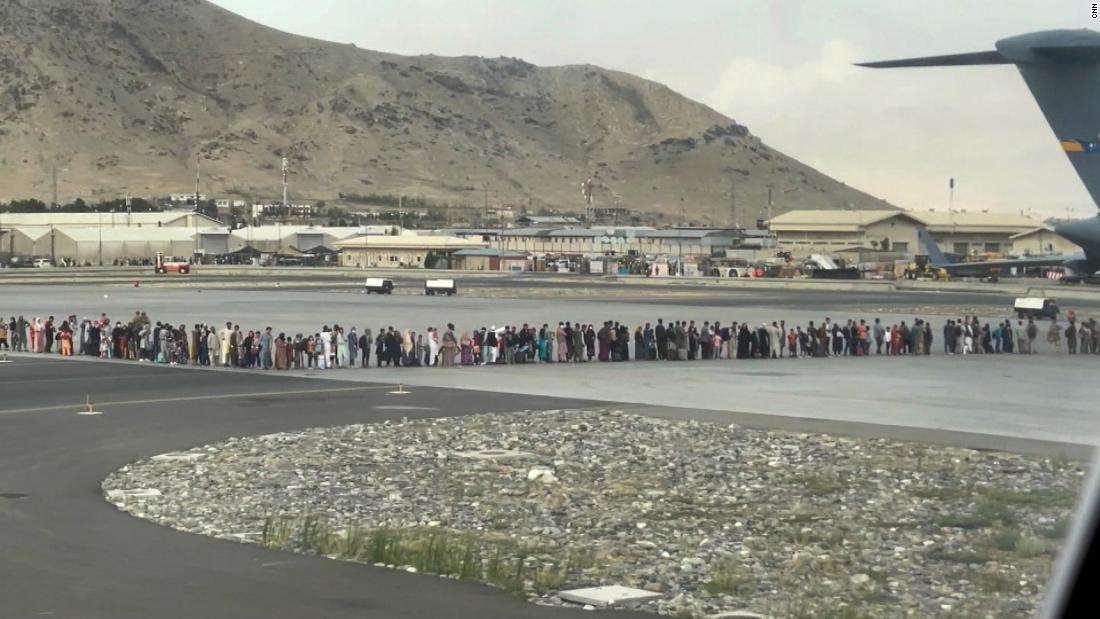Taliban says they won’t allow Afghans to leave country, reject evacuation extension
Taliban spokesman Zabiullah Mujahid told a press conference Tuesday that while foreign nationals could continue traveling to the airport, the huge crowds of Afghans that have gathered there in recent days should return home and would not face reprisals from the country’s new rulers.
“The Afghans leaving, we are not going to allow that, and we are not even happy about it,” Mujahid said.
The doctors and academics of Afghanistan “should not leave this country, they should work in their own specialist areas,” Mujahid added. “They should not go to other countries, to those Western countries.”
Mujahid also gave reassurances that foreign embassies and aid agencies would remain open.
But experts remain dubious of such pledges amid reports of human rights abuses and concerns that the situation will deteriorate further once most of the international community leaves the country.
But Biden decided to maintain the August 31, mindful of the security risks in remaining in Afghanistan longer, the US official said. The President has asked for contingency plans in case he determines at a later date the US needs to remain in the country for longer.
The decision will be met with dismay by allies who fear there won’t be enough time to get their citizens, along with Afghans who assisted in the war effort, out of the country by the end of the month.
Military advisers had told the White House that the decision on the deadline had to be made by Tuesday in order to have enough time to withdraw the 5,800 troops currently on the ground, as well as their equipment and weapons.
The US evacuated a record 12,700 people from Kabul airport between Monday and Tuesday morning, according to a White House official, and another 8,900 people were evacuated by 57 coalition flights. The US has now evacuated some 58,700 people from Afghanistan since August 14.
Meanwhile it emerged that CIA Director William J. Burns had met face-to-face with a top Taliban leader in Kabul on Monday, in what one US official described as “an exchange of views on what needs to happen to be done” by August 31.
The Biden administration has been in regular contact with Taliban officials throughout the course of the evacuation process, both on the ground in Afghanistan and in Doha, Qatar.
US evacuates record number from airport
The number of evacuees in and around Kabul airport swelled to around 20,000 over the weekend. But the pace of airlifts has sharply picked up in recent days, and as of Tuesday afternoon there were 4,671 people awaiting flights, Lieutenant Colonel Brett Lea told CNN.
SIV applicants had been told not to come to the airport on Monday as the US tried to clear backlogs of evacuees and ensure US passport and green card holders got on aircraft out of Kabul before August 31.
The Pentagon said early Tuesday that 17 US military and partner nation aircraft evacuated approximately 16,000 people from Harmid Karzai International Airport within the previous 24 hours, with the US Air Force transporting just under 11,000 of them.
That gave an opening to expand the evacuation, the source said.
“The aperture has widened,” they said. SIV holders plus immediate family and anyone who can “clearly and credibly articulate a clear and credible connection” with the US government could now get out, the source said.
Despite that relaxation of restrictions, the gates to the airport remained closed, the source said.
“But the people who are already there or being pulled in individually, they’re flexing a bit,” they said.
About 300 US citizens had been brought in overnight, and moves were coordinated with the Taliban, the source said. The closure of the airport’s gates, however, significantly reduces the number of SIV applicants who can reach the base.
Afghan security forces continued to use unofficial means to get their colleagues and friends onto the base, the source said. “Not sure who the Afghans are still pulling in, but it seems to be a steady trickle,” they said.
The source also said there had been no progress in the evacuation of locally employed embassy staff, although planning was underway.
While the backlog of evacuees was being whittled down in Kabul, strain was showing up elsewhere in the route that would eventually lead evacuees to resettlement outside Afghanistan.
One of the main waypoints for evacuees, the massive US Ramstein Air Base in Germany, had reached its capacity of 7,800 evacuees on Monday.
Harrowing reports of executions
The frantic evacuation race comes against the backdrop of “harrowing and credible reports” of civilian executions and restrictions on women’s rights under the Taliban in Afghanistan, UN High Commissioner for Human Rights Michelle Bachelet said Tuesday.
The reports included executions of civilians and members of the Afghan security forces, restrictions on girls’ right to attend schools, recruitment of child soldiers, and repression of peaceful protest, Bachalet told the UN’s Human Rights Council in Geneva.
“Many people now fear reprisals by the Taliban against those working with the government or the international community; people who have worked to advance human rights and justice; or those whose lifestyles and opinions are simply perceived to be opposed to the Taliban ideology,” Bachalet said.
The reports of violence lie in stark contrast to Taliban assurances to international media since seizing the capital over a week ago.
CNN’s Nick Paton Walsh reported from Doha, Sheena McKenzie wrote from London and Brad Lendon wrote from Hong Kong. Nicole Gaouette, Barbara Starr, Jennifer Hansler, Kylie Atwood, Kevin Liptak, Mick Krever, Inke Kappeler, Sharon Braithwaite, Claudia Rebaza and Amy Cassidy contributed to this report.
![]()


